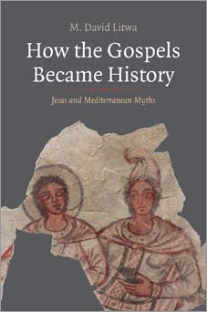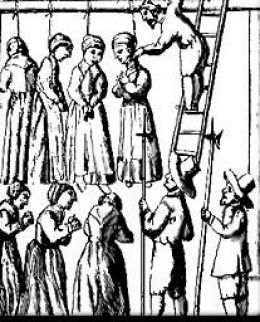 Chapter 11 of How the Gospels Became History again makes for fascinating reading as M. David Litwa explores in some depth the idea of the scapegoat in Greek myth as one part of the cultural and mythical context in which the gospels were written. The technical (Greek) term is pharmakos [link is to a brief Wikipedia definition and discussion of the term]. I first came across the idea in ancient Greek myth way back in high school when I read Mary Renault’s The King Must Die. My recollection of the impact that novel had on me was a kind of awe or horror. The idea is that to save a people from some sort of divine vengeance their king must be sacrificed to make way for a life-promising replacement. But the king is too noble to die so he must in some way be made worthy of death and that led to his being defiled and humiliated through some sort of maltreatment.
Chapter 11 of How the Gospels Became History again makes for fascinating reading as M. David Litwa explores in some depth the idea of the scapegoat in Greek myth as one part of the cultural and mythical context in which the gospels were written. The technical (Greek) term is pharmakos [link is to a brief Wikipedia definition and discussion of the term]. I first came across the idea in ancient Greek myth way back in high school when I read Mary Renault’s The King Must Die. My recollection of the impact that novel had on me was a kind of awe or horror. The idea is that to save a people from some sort of divine vengeance their king must be sacrificed to make way for a life-promising replacement. But the king is too noble to die so he must in some way be made worthy of death and that led to his being defiled and humiliated through some sort of maltreatment.
Litwa discusses the Greek myths of the Athenian king Codrus and the Theban Menoeceus who were two such scapegoats. A person of royal blood had to be sacrificed to save the city. In the case of Codrus,
To do so, he must change his form; he must go from the one highest in honor to the lowest. So the king dresses himself in the rags of slaves.
and in that of Menoeceus,
Twice the poet Statius (a contemporary of the evangelists) called Menoeceus a “sacrificial animal,” led “like a silent sheep from the flock.” Yet the hero’s heart is possessed by heavenly power. Before he sacrifices himself, he prays, “O gods above . . . and you who grant me to die by so great a death, Apollo, give constant joy to Thebes. This joy I have covenanted to give and lavishly bought with the price of all my blood.” When Menoeceus plummets to his death, his spirit rises before the high deity. In the city, the hero is worshiped with altars and temples.
(Litwa, p. 137)
We can see overlaps with the way the evangelists have structured the story of Jesus. The theme of such a death was part of the cultural heritage of the authors of the life of Jesus.
Another similarity Litwa addresses in some depth is that often the scapegoat is convicted of a religious crime of some sort:
The pharmakos is often convicted of what moderns would call a religious crime. He or she is accused of robbing a temple or somehow damaging it. Alternatively, the pharmakos may criticize how temple rituals are carried out and so incur the charge of blasphemy (hostile speech against a god). The perceived crime leads to a violent response on the part of the temple staff and city officials. They attempt to capture the pharmakos by deceit. When they capture him, they often beat him, parade him around the city, try him in a kangaroo court, and murder him. The willing pharmakos dies sac- rificially to safeguard the community. Yet the unjust death of the pharmakos incites divine punishment against the civic leaders — a plague, famine, or invasion.
(138)
At this point Litwa draws readers into a detailed comparison of the lives and deaths of Aesop and Jesus. For other comparisons online see first of all a post by Matthew Ferguson on his blog,
Others on Vridar,
- What Does a “Life of Jesus” Look Like?
- Reading the Classics and the Gospels Differently
- And once more . . . .
Litwa shows how, like Jesus, Aesop had the humblest of beginnings, yet was able to utter sorts of “parables” to confound and outsmart those who believed they were his betters, and in the end goes to Delphi, the sacred city of Apollo, is welcomed at first but soon his hosts turn against him, exacerbates the situation by speaking “parables” against the sins of the people and the priests in particular, is dragged out to his death outside the city, is subsequently worshipped as a god. Furthermore, the city of Delphi is sacked by enemies as punishment for their crime.
Litwa draws attention to the fact that Aesop was generally assumed to have been a historical figure. I find it difficult to think of the surviving versions of the Life of Aesop as “historical” narratives, however. Yet I have to grant that genres in ancient Greco-Roman literature were not so neatly defined as they are today, and “historical” accounts were not histories in the same sense moderns think of historical works. Ancient historical narratives were generally aimed to teach moral lessons and perhaps just as importantly, were aimed at entertaining their audiences. (Even Thucydides, usually upheld as the exemplar of dry detailed fact reporting, used devices from the poets and dramatists to add colour to his work.) The same techniques that Litwa identifies as adding an air of plausibility to ancient historical accounts (the death of Aesop was accompanied by earthquakes and other signs of divine displeasure) were also used by Greek novelists, dramatists and poets in their accounts of past heroes and the activities of gods in their lives and deaths.
It’s a fascinating chapter. It shows how the story of Jesus fit cultural paradigms of the first and second centuries CE Mediterranean world. We may look on the pharmakos theme as myth but it could be real enough in the minds of ancient audiences, as it is for many today.
| To order a copy of How the Gospels Became History: Jesus and Mediterranean Myths at the Footprint Books Website with a 15% discount click here or visit www.footprint.com.au
Please use discount voucher code BCLUB19 at the checkout to apply the discount. |
Litwa, M. David. 2019. How the Gospels Became History: Jesus and Mediterranean Myths. New Haven, CT: Yale University Press.


